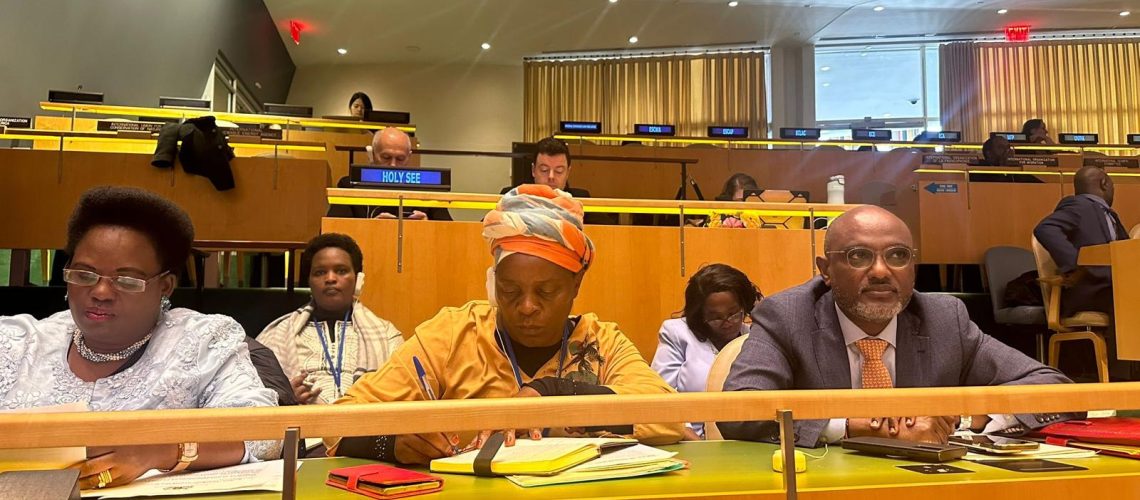
Hon. Betty Amongi delivers a powerful statement on behalf of the African group at the ongoing 68th Session of the Commission on the Status of Women: 2024, New York, USA.
By; Enoch Tusubira
The Minister of Gender, Labour and Social Development Hon Betty Amongi, has called on the global community to adopt an inclusive approach in implementing the 2030 Agenda. Speaking on behalf of the African Group at the ongoing 68th Session of the Commission on the Status of Women meeting at the United Nations in New York, USA, the Minister called for reinforced International cooperation for a fair global trading system, reforms in the international financial architecture, promoting access to global markets and technologies.
The Minister applauded the adoption of Agenda 2030 as a clear indication that the future of humanity lies in our hands, and called on collective action to fight poverty and hunger, which she says still affects millions of people with an estimated 10% of them being women, most of whom are from Sub-Saharan Africa.
Hon. Amongi emphasized that SDG goals 1 & 5 on ending poverty in all it’s forms and dimensions by 2030, and achieving gender equality and empowerment of all Women and Girls respectively, requires investment in a comprehensive set of economic and social policies aimed at driving women’s full economic participation. She suggested that accelerating progress requires national, regional, and international efforts to harness achievement of the goals.
Because women continue to face discrimination, carry the burden of poverty, and remain vulnerable, outnumbering men among the world’s poorest people, the Minister noted that progress in the achievement of SDG 5 on gender equality and the empowerment of all women and girls is slow and may not be fulfilled by its target date. She welcomed emphasis on strengthening efforts for women and girls to realize the right to the enjoyment of the highest attainable standards of physical, mental work, as well as their right to education, employment and decent opportunities.
Hon. Amongi echoed the views of the African Group which is cognizant that poverty is a complex problem involving a set of economic and social development issues that cannot only be solved through economic growth, but through a human-centered approach as recognized by the principles and goals of the Copenhagen Declaration.
Additionally, the Minister stressed that the group underscores the need to build peaceful, just, and inclusive societies. It appeals that women in conflict, post conflict zones and in countries facing sanctions should be accorded assistance needed to strengthen their productive capacities in all sectors that will enable them to move to sustainable patterns of consumption and production with equal footing with women from other countries.
She reiterated the group’s appeal that the international commitment should provide inclusive equitable quality education and bridge the digital divide at all levels and to those in vulnerable situations to have access to life-long learning opportunities that help them acquire knowledge and skills needed to exploit them to participate fully in the societies.
“Women’s lack of access to land, agricultural technologies and financial capital hinders opportunities to diversify their livelihoods or increase resilience in the face of disasters.” Hon. Amongi said.
“On the other hand, African leaders understand that gender equality and the empowerment of women and girls is not just a goal in itself, but a key to meaningful sustainable development and economic growth.” She added.
Before conclusively reaffirming the group’s commitment to the implementation of the CSW68 theme; “Accelerating the achievement of gender equality and the empowerment of all women and girls by addressing poverty and strengthening institutions and financing with a gender perspective.,” Hon. Amongi finally reverberated the group’s agreement to the building of resilient infrastructure, promotion of inclusive, sustainable industrialization, and fostering innovation targeted to women and girls.
The group called on the international community to fulfill their commitments including the reforms of the international financial architecture, transfer of ODA, including the commitment of devout 0.7% of donors’ national income, transfer of technology and access to markets as well as technical assistance and capacity building which remain critical for women and girls in Africa to exercise their potential.
For a comprehensive version of her statement Click Here.

Leave a Reply